The Assassin Blu-ray Movie
HomeThe Assassin Blu-ray Movie 
刺客聂隐娘 / Ci Ke Nie yin niangWell Go USA | 2015 | 105 min | Not rated | Jan 26, 2016
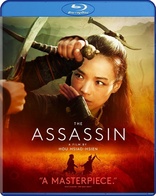
Movie rating
6.3 | / 10 |
Blu-ray rating
| Users | 0.0 | |
| Reviewer | 4.0 | |
| Overall | 4.0 |
Overview
The Assassin (2015)
9th century China. 10-year-old general's daughter Nie Yinniang is abducted by a nun who initiates her into the martial arts, transforming her into an exceptional assassin charged with eliminating cruel and corrupt local governors. One day, having failed in a task, she is sent back by her mistress to the land of her birth, with orders to kill the man to whom she was promised - a cousin who now leads the largest military region in North China. After 13 years of exile, the young woman must confront her parents, her memories and her long-repressed feelings. A slave to the orders of her mistress, Nie Yinniang must choose: sacrifice the man she loves or break forever with the sacred way of the righteous assassins.
Starring: Shu Qi, Chang Chen, Satoshi Tsumabuki, Chun Shih, Yun ZhouDirector: Hsiao-Hsien Hou
| Foreign | 100% |
| Drama | 71% |
| Martial arts | 17% |
| Melodrama | 5% |
| Action | Insignificant |
Specifications
Video
Video codec: MPEG-4 AVC
Video resolution: 1080p
Aspect ratio: 1.41:1
Original aspect ratio: 1.37:1, 1.85:1
Audio
Mandarin: DTS-HD Master Audio 5.1
Mandarin: Dolby Digital 2.0
Subtitles
English, French, Mandarin (Simplified), Mandarin (Traditional)
Discs
25GB Blu-ray Disc
Single disc (1 BD)
Packaging
Slipcover in original pressing
Playback
Region A, B (C untested)
Review
Rating summary
| Movie | 4.0 | |
| Video | 4.5 | |
| Audio | 4.0 | |
| Extras | 1.5 | |
| Overall | 4.0 |
The Assassin Blu-ray Movie Review
The golden (aspect) ratio.
Reviewed by Jeffrey Kauffman January 14, 2016Some of the most interesting if also the most contentious discussions on various home video related forums (including those here at Blu-ray.com) involve aspect ratios. It’s almost a given these days that film aficionados are at least relatively well versed in the ins and outs (and “wides” and “narrows”) of various aspect ratios, though this wasn’t always the case, as evidenced by the PR battle some studios and/or labels engaged in when so-called “widescreen” home video releases first started being offered. While home video consumers have become better educated over the intervening years about aspect ratios, there’s still an almost subliminal and some might say philosophical underpinning to various aspect ratios that rarely rise to the level of active discussion. In other words, folks are often prone to argue about various aspect ratios (especially when they’re tweaked from their original theatrical exhibition presentations) without ever really thinking about why various aspect ratios have been utilized in the first place. There has been at least one notable exception to this inattention to aspect ratio “theory” (so to speak), Wes Anderson’s The Grand Budapest Hotel, a film which trafficked in a number of different “frame sizes” as it explored various timelines and story elements. The Assassin has received pretty rapturous reviews since it first opened, and while many critics mention a supposed “Academy ratio” prologue, very few then detail a number of other odd aspect ratio fluctuations that occur throughout the film, in a way that is at least arguably less organic than the way Anderson employed them in his film. Director Hou Hsiao-Hsien has been interviewed repeatedly about some of the choices he made for The Assassin, including to shoot on film, and there has been at least passing discussion of his use of "Academy ratio," though very little discussion of the changes of aspect ratio (some quite small) within what might be called an "Academy ratio spectrum" (just as some folks are prone to call everything from 1.33:1 to 1.37:1 and even wider "Academy ratio"). This might all boil down to what might be called "If.... Syndrome", a tendency to over analyze choices that sometimes have mundane explanations. Critics tied themselves into knots trying to "explain" Lindsay Anderson's ping ponging between color and black and white in If...., when both he and Malcolm McDowell have suggested that there was nothing really "philosophical" going on, and that choices were made for expediency's sake, as well as the budget. But the oddly variable aspect ratios in The Assassin seem like something else, something that is either (at times) distractingly random or at least way too "meaningful" for this particular reviewer to deconstruct.
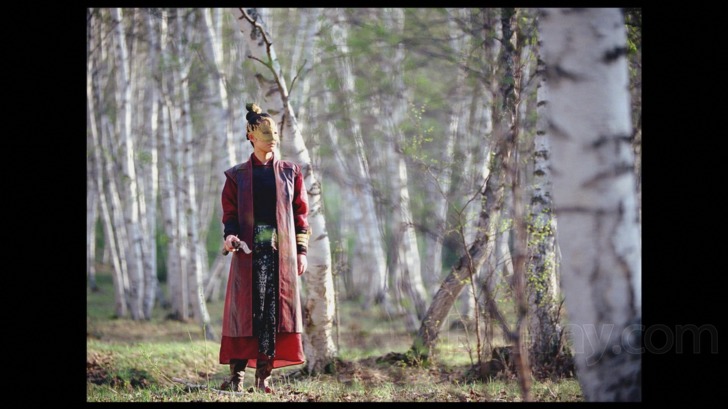
Some of that very “If…. Syndrome” might accrue irrespective of the aspect ratio issue due to the fact that The Assassin begins with a black and white prologue, the only monochromatic sequence in the otherwise lushly colorful film. This at least seems to be grounded in some kind of structural context, since it gives a quick introduction to the titular hit woman, Nie Yinniang (Shu Qi), and her scheming mentor, a kind of combo nun-wuxia expert (there must have been lots of those, don’t you think?) named Jiaxin (Sheu Fang-yi). Yinniang has been raised and trained to be a cold blooded killer, an unexpected assailant who can seemingly appear out of nowhere to dispatch corrupt officials and other nefarious villains in the Tang Dynasty Era.
Yinniang’s incredible skill is demonstrated beyond a shadow of a doubt in the first moments of the film, but a second planned killing doesn’t go exactly as planned when Yinniang finds her ostensible victim with a child and decides not to go through with the hit. That decision doesn’t sit well with Jiaxin, who then tasks her charge with a seemingly impossible situation, returning to the place of her birth to confront and kill provincial governor Tian Ji'an (Chang Chen), Yinniang’s own cousin with whom she has also shared a romantic history.
There are a number of sidebars that inform various narrative arcs, including a traditionally duplicitous aide whose banishment ultimately leads to a showdown, as well as a brief tour through the supernaturalism that often accompanies wuxia films. But it’s obvious that Hou Hsiao-Hsien is aiming for something more idiosyncratic here. The Assassin does have its exciting set pieces, but this is a peculiarly ruminative film that sees large swaths of exposition playing out in relatively static dialogue scenes. In fact the film is a deliberate exercise in mise en scene, which again often brings the whole aspect ratio up, at least for those who obsess about presentation as much as about content. There’s one relatively brief opening up of the frame to 1.84:1 (see screenshot 4), which is somewhat perplexing considering its brevity. This strangeness is made perhaps even more so due to the fact that there are later sequences, notably a long court segment with two acolytes to Tian Ji’an presenting opposing viewpoints, where a wider aspect ratio could have helped Hou Hsiao-Hsien to simply leave his camera plunked down and stationary (something he seems to want to do most of the time in the film), instead of panning back and forth between various participants.
Many readers may be wondering “what the big deal is” with the aspect ratio issue, but for a film as dependent on style as The Assassin is, it’s a question at least worthy of some consideration. If the attempt was to deliver an “old school” feel to the film, which Hsiao-Hsien has alluded to in some interviews, why then that one brief opening up to widescreen “glory”? And why the subtle fluctuations within the “Academy ratio spectrum”? The fact is that as convoluted and even confusing as The Assassin’s narrative sometimes is, from a pure content standpoint, there’s not a whale of a lot of “there” there, which means the film’s presentational aspects (pun intended) rise all the more to the forefront. The Assassin is a fascinating film to watch, not just for its stunningly beautiful tableaux, but also at least in part due to the teasing technical questions it raises but never answers.
The Assassin Blu-ray Movie, Video Quality 
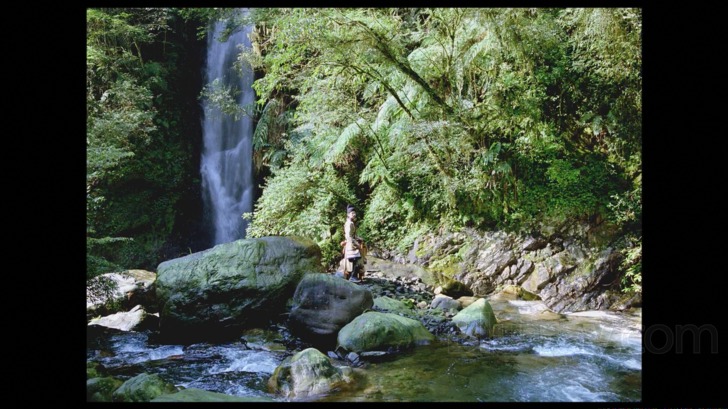
The Assassin is presented on Blu-ray courtesy of Well Go USA with an AVC 1080p transfer in a variety of aspect ratios, with the bulk of the film at 1.41:1 (just a tad wider than traditional Academy ratio). Some of the variances from 1.41:1 are narrower (screenshots 5 and 7 are closer to 1.40:1, a negligible difference, while screenshot 10 is in the noticeably narrower 1.38:1), while as mentioned above in the main body of the review, there's a very brief interstitial moment where the frame is widened to 1.84:1 (see screenshot 4). (Note that the narrower aspect ratios are presented in a window boxed format.) Hou Hsaio-Hsien and cinematographer Mark Lee Ping Bin shot The Assassin on 35mm film, and the result is a really palpably textured offering a lot of the time. The opening pre-credits prologue is presented in high contrast black and white, with some appealingly deep and convincing blacks and extremely well modulated gray scale. The rest of the film is in color, and offers a robust palette which emphasizes tones in the red, yellow and orange arenas quite a bit of the time, at least within the confines of the court world. The intrigue of the court world is sometimes given a visual analog when Hsiao-Hsien will frame a scene through a scrim of sorts, courtesy of the veiled curtains that surround various rooms in the palace. That can give a gauzy, soft appearance to some scenes and minimally detract from detail levels. The film really pops best when it ventures outside, which it does quite often. Here, the palette perks up appreciably, even when heavily filtered toward blue (see screenshots 17 and 18). In normally lit and graded exterior scenes, there's a really appealing sharpness and precision to the visuals, with excellent depth of field in wide shots and commendable fine detail in close-ups. Contrast is generally solid, though some dim interior scenes and one brief nighttime sequence suffer from murky shadow detail. Though housed on a BD-25, The Assassin isn't overly lengthy and the disc is otherwise unburdened with a glut of supplements, offering enough real estate for a compression problem free presentation that looks agreeably organic.
The Assassin Blu-ray Movie, Audio Quality 
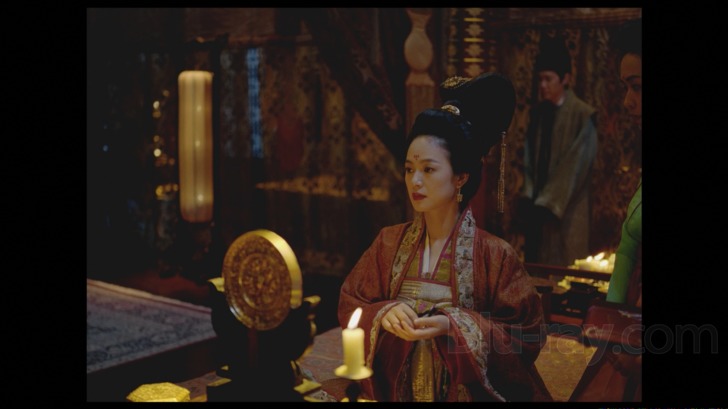
The Assassin features an alternately nuanced and bombastic DTS-HD Master Audio 5.1 track in the original Mandarin. The film utilizes both hyperbolic sound design in a couple of set pieces as well as a quieter approach to the bulk of the film, which often plays out in undemanding dialogue scenes. Still, there's nice attention paid to differing ambient environments, with clear changes in reverb and spatial presentation between interior court scenes and the outdoor environments. Dialogue, effects and score are all presented cleanly and clearly, with excellent prioritization. While the film doesn't really overly exploit LFE, there's sufficient dynamic range here to please most audiophiles.
The Assassin Blu-ray Movie, Special Features and Extras 
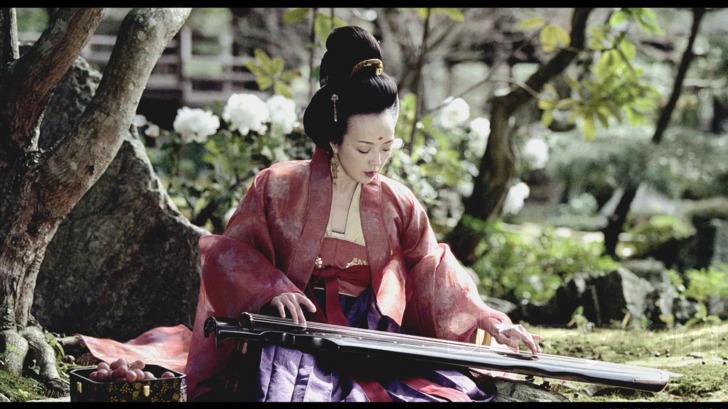
- Behind the Scene (sic) contains the following brief behind the scenes featurettes:
- Nie Yinniang (1080i; 3:11)
- The Actors: No Rehearsals (1080i; 3:45)
- The Fights Between Masters (1080i; 2:55)
- A Time Machine to the Tang Dynasty (1080i; 3:01)
- Trailer (1080p; 2:37)
The Assassin Blu-ray Movie, Overall Score and Recommendation 
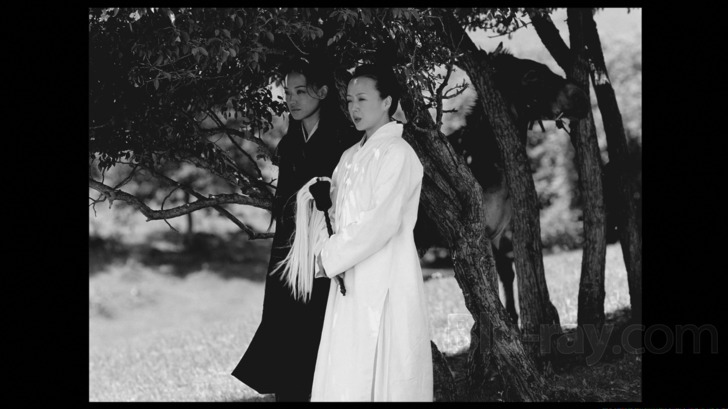
I'm not quite sure that The Assassin is the unqualified masterpiece it was hailed as being by at least some critics at the time of its theatrical exhibition (other critics were more lukewarm, to be fair). There's undeniable grandeur to the visuals, but the story is both convoluted and simplistic. Still, it's obvious that Hou Hsiao-Hsien was aiming for something different and perhaps more personal here, and the result is an almost hypnotic take on wuxia, one which emphasizes talk over wire work or martial arts acumen. That may mean that adrenaline junkies may be wanting a bit more of a jolt than the film ultimately ends up offering. Maybe they can get exercised about those changing aspect ratios. Technical merits are first rate, and The Assassin comes Recommended.
Similar titles
Similar titles you might also like

The Grandmaster
一代宗師 / Yi dai zong shi
2013

Fearless
Huo Yuanjia | 霍元甲 | Theatrical, Unrated, & Director's Cuts
2006

Dragon Inn
龍門客棧 / Long men kezhan
1967

A Touch of Zen
俠女 / Xia nü
1971

Legend of the Fist: The Return of Chen Zhen
Collector's Edition | Jing mo fung wan: Chen Zhen
2010

Shadow 4K
影 / Ying
2018

An Empress and the Warriors
江山·美人
2008

Shaolin
新少林寺 | Collector's Edition
2011

The Villainess
악녀
2017

The Warlords
Tau ming chong
2007

Cemetery of Splendor
2015

Seven Swords
七劍 / Qi jian
2005

Operation Red Sea
红海行动 / Hong hai xing dong
2018

The Guillotines
Xue Di Zi
2012

Ip Man 3 4K
2015

Wolf Warrior 2
Wolf Warriors 2 / Zhan lang II / Wolf Warrior II / 战狼II
2017

The Conformist
Il Conformista | 4K Restoration
1970

13 Assassins
Jûsan-nin no shikaku
2010

True Legend
Su Qi-Er
2010

Memories of the Sword
2015